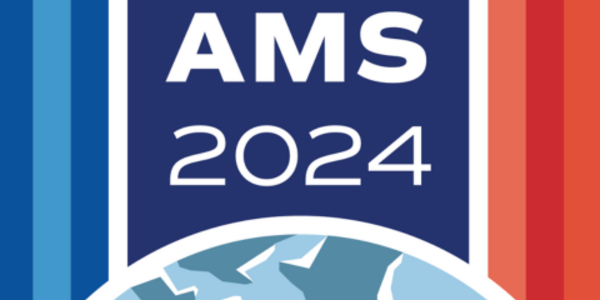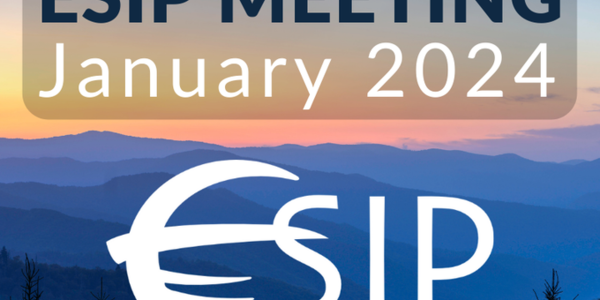
Several of our scientists and staff are attending the 2017 American Meteorological Society Annual Meeting from January 22 through January 26. The meeting brings together more than 3,500 scientists, educators, students, and other professionals from across the weather, water, and climate community. Attendees encounter unique opportunities to share with, learn from, and collaborate with their colleagues to further advance the scientific community’s understanding of how the entire Earth system works, functions, and evolves.
Check out the topics below to learn more about some of the products and services that our scientists are highlighting at the meeting. And, follow #AMS2017 and #NCEIatAMS on social media for more updates on the AMS Annual Meeting and our contributions to it.
Visit the NOAA Booth
Some of our scientists will also be giving presentations at the NOAA booth (booth 427). If you’re attending the meeting, stop by and visit the booth in Exhibit Halls 4A and 4B to hear:
-
Margarita Gregg speak about the nation's source for integrated environmental information on Wednesday at 9:30 a.m. (PST)
-
Stephanie Herring speak about explaining extreme events in a changing climate on Wednesday at 11:00 a.m. (PST)
-
Mike Brewer speak about local applications to NOAA's climate data on Wednesday at 3:25 p.m. (PST)
NOAA meteorologists and other scientists will also be available to talk with you and answer any questions you may have about our data, products, and services.
Building Disaster Resilience in Alaska, Hawaii, and the U.S. Affiliated Pacific Islands
On Tuesday, January 24, NCEI’s Engagement Team will hold a side panel discussion on building disaster resilience and response in Alaska, Hawaii, and the U.S. Affiliated Pacific Islands from 5:45 to 8:30 p.m. (PST) in room 620. At this session, members of our Engagement Team will come together with government partners, emergency managers, and field experts to discuss current techniques, datasets, and challenges related to wildfire disasters and response in the region. This discussion will foster and reinforce lines of communication and develop the resilience of the nation’s resources and infrastructure.
Check out the list of AMS presentations and posters below for opportunities to learn more about our environmental data, information, and services.
NOAA’s State Climate Summaries
In response to growing demands for state-level information on the assessment of climate change, NCEI and the North Carolina State University’s Cooperative Institute for Climate and Satellites–North Carolina (CICS-NC) have produced a set of climate summaries for all 50 U.S. states. These summaries provide up-to-date information on observed and projected climate changes for each state. Focusing on characteristics of the physical climate and coastal issues in accordance with NOAA's mission, these summaries are designed to supply decision makers, other stakeholders, and the public with highly relevant climate information delivered in an accessible and compact format.
Visit the interactive website to access these summaries, and check out the list of AMS presentations and posters below for opportunities to learn more about local climate data and information.
State of the Climate Assessments
We place a high priority on interpreting and applying scientific understanding to our extensive array of climate datasets. To that end, we provide analyses of weather and climate events, placing them into proper historical perspective, understanding their unusualness, and—increasingly—comparing recent events to expectations of future climate conditions. We recently released the 2016 Annual U.S. Climate Report Summary, which provides an analysis of the year’s climate.
Visit our State of the Climate website for our latest analysis, and check out the list of AMS presentations and posters below for opportunities to learn more about our understanding of Earth’s climate system.
Regional Ocean Climatologies
Our regional ocean climatologies provide long-term information, analyses, and averages of observations, such as temperature and salinity, for a variety of key regions around the world. Among others, the Northwest Atlantic, Arctic, East Asian Seas, and Gulf of Mexico regional climatologies each provide a variety of data for regions that can play crucial roles in long-term Earth and ocean climate change.
Visit our Regional Climatologies web page to access these data, and check out the list of AMS presentations and posters below for opportunities to learn more about our wide range of ocean and coastal data, products, and services.
Climate Data Records
NOAA’s Climate Data Record (CDR) Program strives to develop and implement a robust, sustainable, and scientifically defensible approach to producing and preserving climate records. CDRs reveal Earth’s short- and longer-term environmental changes and variations, allowing scientists and decision makers to better understand and assess the climate system and its impacts across society.
Visit the CDR Program website to access these scientifically sound, consistent, and reliable products, and check out the list of AMS presentations and posters below for opportunities to learn more about CDRs.
Drought Monitoring
We monitor and provide access to a host of drought-related information, including the current U.S. Drought Monitor maps, the National Integrated Drought Information System Drought Portal, U.S. Palmer Drought Indices, the U.S. Standardized Precipitation Index, and U.S. State and Regional Precipitation Status.
Visit our drought-monitoring website and the Drought Portal to access these data and resources, and check out the list of AMS presentations and posters below for opportunities to learn more about precipitation and drought-related data, products, and services.
NCEI’s Presentations and Posters
All times listed below are in Pacific Standard Time, and all rooms are located in the Washington State Convention Center.
Monday, January 23
- The U.S. and Global Climate Conditions of 2016 in Historical Perspective, Karin Gleason, 11:00 a.m., Room 605
- New Energetic Particle Observations at Geosynchronous by the GOES-R Series Space Environment In‐Situ Suite (SEISS), Brian Kress, 11:15 a.m., Room 620
- Climate Scenarios for the Fourth National Climate Assessment and the Sustained Assessments Process, Dave Easterling, 11:30 a.m., Room 605
- Assessment of Climate Variability to Incidence of Coccidioidomycosis, Jesse Bell, 1:45 p.m., Conference Center: Tahoma 5
- Evaluation of In-Situ Soil Moisture Metrics to Monitoring Hydrological Extremes, Ronnie Leeper, 2:15 p.m., Room 602
- The India-U.S. Partnership for Climate Resilience, Michael Tanner, 5:00 p.m., Yakima
Tuesday, January 24
- Effects of MMTS on Long-Term Extreme Temperature Trends, Ken Kunkel, 8:45 a.m., Room 609
- Lessons in Diversity: How 40 Different Data Sources Were Combined to Create Version 2 of the Integrated Global Radiosonde Archive, Imke Durre, 9:45 a.m., Room 310, Download Presentation
- Tools for Climate and Weather Data Discovery, Rich Baldwin, 10:45 a.m., Room 608
- Becoming the National Centers for Environmental Information: An Over 50-Year History of Climate, Oceans, Coastal, and Geophysical Data and Information, Greg Hammer, 11:45 a.m., Yakima 2, Download Presentation
- Updating a Climatology of Extreme Snowfall Events in the United States, Jared Rennie, 2:30 p.m. to 4:00 p.m., Exhibit Hall 4E, Download Poster
- NOAA's State Climate Summaries for the National Climate Assessment: State-Level Trends in Temperature and Precipitation, Ken Kunkel and Laura Stevens, 2:30 p.m. to 4:00 p.m., Exhibit Hall 4E, Download Poster
- Development of a Bow-tie Inversion Technique for Real-time Processing of the GOES-R SEISS MPS-HI Electron Channels and Comparison with the Baseline Matrix Inversion Technique, Brian Kress, 2:30 p.m. to 4:00 p.m., Exhibit Hall 4E
- NOAA's State Climate Summaries for the National Climate Assessment: A Resource for Decision Makers, Laura Stevens, 2:30 p.m. to 4:00 p.m., Exhibit Hall 4E, Download Poster
- Introducing NOAA's Climate Data Record Best Practices into NCEI's Center for Weather and Climate (CWC) Products, Dan Wunder, 2:30 p.m. to 4:00 p.m., Exhibit Hall 4E
- Customer Use Cases and Analytics for Climate Data at NOAA's National Centers for Environmental Information, Mike Brewer, 5:15 p.m., Room 605
- Evolving NOAA's Climate Data Portfolio In Response to Validated Sectoral Needs, Jeff Privette, Room 611
Wednesday, January 25
- National Centers for Environmental Information and Social Media: Reaching the World Using Facebook and Twitter, Katy Matthews, 8:30 a.m., Room 612, Download Presentation
- Making Historical Data Discoverable, Christina Lief (Presented by Laura Stevens), 10:45 a.m., Chelan 5
- Relationship Between Precipitation and Traffic Fatalities: A High-Resolution Comparison, Scott Stevens, 1:45 p.m., Room 613
- Climate Change Adjustments for Intensity-Duration-Frequency Extreme Precipitation Values, Ken Kunkel, 2:30 p.m. to 4:00 p.m., Exhibit Hall 4E
Thursday, January 26
- Recovering from or Terminating a Drought: Perspectives from California, Mike Kruk, 10:45 a.m., Room 602



